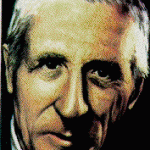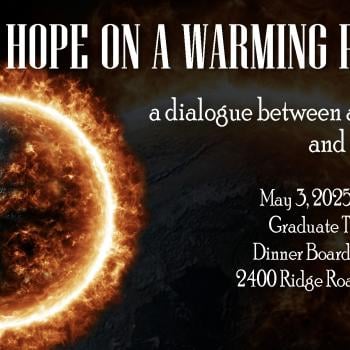Science and Religion in Big History
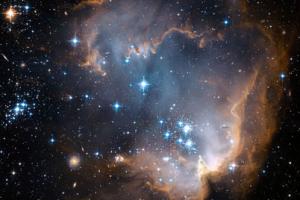 Science and religion in Big History: how do these three connect? This is the question we began asking in a previous post: Science, Religion, and Deep Time. Let’s pick up where we left off.
Science and religion in Big History: how do these three connect? This is the question we began asking in a previous post: Science, Religion, and Deep Time. Let’s pick up where we left off.
Big historians think of their field as evidence-based. By this they mean scientific evidence. And only scientific evidence. Extramundane epistemologies do not count. By implication, neither do the epistemologies associated with anything in the Humanities such as art, music, poetry, and religion. Can you imagine history without the Humanities?
Just how, then, do we understand science and religion in Big History? What model of the science-religion interaction do big historians rely on? Answer: Scientific Imperialism.
In an article elsewhere — “Science and Religion: Ten Models of War, Truce, and Partnership” — I adumbrate ten different ways in which science and religion are commonly thought to relate. Scientific imperialism is one of the ten. According to this model, science and relgion are in conflict. More. Science is thought to open the only doorway to truth. No one has truth other than the evidence-based scientist. Therefore, the scientific army must defeat the religious forces of untruth. Still more. Whatever contributions religion has made to culture should be plundered and become the contributions of science.
Scientific Imperialism within Big History
According to the scientific imperialism model, a scientific army seeks to plunder religion and take possession of its spoils. What are those spoils? Here are seven: (1) religious questioning; (2) morality; (3) the soul; (4) life-beyond-death; (5) religious symbols; (6) faith; and (7) religious experience. We need not itemize all of these in this short treatment. Big historians do not need to pillage all seven. Just a couple will suffice: religious questioning and morality.
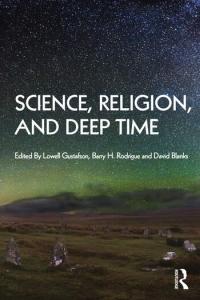
First, religious questioning is an object for scientific pillage. “Science has actually advanced to the point where what were formerly religious questions can be seriously tackled…[by] the new physics,” writes Arizona State University physicist Paul Davies (Davies 1983, ix). The question of God is no longer a religious question; it is a scientific one. Davies is not a big historian. But he sets the agenda of scientific imperialism for those who strive to restrict their knowledge to what scientists say.
In every age the human psyche asks: where did we come from? What is the meaning of our being here? In archaic culture, myths of origin explored this questioning.
Within Big History, a new scientized version of our origin replaces the now outdated mythical accounts. Today’s scientized Big History pillages archaric religion’s provenance over stories of origin. The modern origin story, say the big historians…
“…offers a literal account of the origin of everything. It expects to be taken seriously as a description of what actually happened beginning about 13.8 billion years ago. It is not simply a poetic attempt to make up for ignorance”(Christian, 2014, 14).
Whereas our ignorant ancestors relied upon religious myths to question our origin, today’s big historian provides an evolutionary explanation of origin devoid of religious or poetic meaning.
The Scientific Pillaging of Religious Morality
The first spoil to be pillaged is religious questsioning, expressed classically in myths of origin. Next is morality. How can we provide an evolution-based account of morality that will replace religious morality?
Recall that our big historians rely on sociobiology and evolutionary psychology for some of their science. One of the founders of sociobiology is the late Edward O. Wilson at Harvard. Wilson’s military aim is to pillage religion of its claim to ground morality. Morality, contends Wilson, is grounded in evolution. And according to an evolutionary morality, religion is downright immoral.
Why is religion immoral? Because it teaches non-cooperation between the religions. This leads to violence. We can blame violence on religion. We don’t blame science for violence. Only religion.
Wait a minute? I thought religion was adaptive because it fostered cooperation. Now, Wilson claims religion is maladaptive because it immorally teaches non-cooperation.
What kind of argument is this? Well, recall that religion is said to be evolutionarily adaptive because it teaches cooperation. But that cooperation is only for the in-group, for the tribe. Everyone in the outgroup becomes the enemy. This is what we’re told by sociobiologists: in-group cooperation sponsors violence toward the out-group. Religions compete with other religions. This makes them violent.
An evidence-based and evolution-based morality, to the contrary, would embrace cooperation universally for the entire human race. Therefore, we today must eliminate religion and replace it with a science-based unified society.
“The great religions are tragically…the sources of ceaseless and unnecessary suffering. There are impediments to the grasp of reality to solve most social problems in the real world. Their exquisite human flaw is tribalism …. Faith is biologically understandable, as a Darwinian device for survival and increased reproduction” (Wilson 2014, 150-151).
Religion is good for reproductive fitness and even for internal group cooperation. But religion’s flaw is tribalism. Could Big History overcome religion’s flaw and provide a new political order? Yes, indeed. Here is the way big historian Lowell Gustafson expresses the replacement of religion by Big History.
“Big History is an evidence-based account that presents a common origin of all nations and civilizations. In that sense, it serves as a persuasive way to imagine a common tie that binds humanity….Does Big History in this sense serve the idea of religion? Not about gods, but about the measurable and the non-material ties that bind” (Gustafson, Lowell; Barry Rodrique, and David Blanks, eds 2023) (Gustafson, 2023, 137)
If big historians are ready to follow Wilson and seek to make evolution rather than religion the ground of morality and even politics, then they would march to the drumbeat of a scientific defeat of religion. Science must replace religion as the ruler of the civil social order. This applies to Wilson. Does it apply to big historians as well?
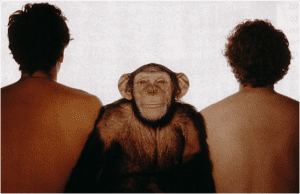
As I said, the model followed by big historians is a form of scientific imperialism. The spoils of religion are now taken over by a science-based retelling of the universe story.
Does this make rational sense? Is it coherent? Curiously, Wilson grounds his scientific moral order for civilization in the same evolutionary process which gave rise to immoral tribal religion in the first place. Now, which is it: in-group cooperation with competition or universal cooperation without cmpetiton? Wilson is inconsistent. Do big historians want to inherit this inconsistency?
In short, the big historian’s reliance upon evolution may lead to a constipated worldview unnecessarily hardened against an honest assessment of religion in human history.
Plundering Religion
Do big historians understand themselves as scientific imperialists plundering religion? Almost. Here’s J.N. Nielsen writing in the January 2021 IBHA Newsletter.
“The big historian may be sympathetically characterized as having transcended traditional disciplinary boundaries and come to a higher understanding. Less sympathetically, we may be seen as plunderers who come to another discipline only to smash and grab, without understanding the damage that we do. Probably the truth is somewhere in the middle.”
Is Big History a cult?
We’re asking about the role of science and religion in Big History. Big historians would like to absorb religion and profit from the spoils of religion’s defeat. Does that turn BH itself into a cult?
No, not yet. I have not yet seen other features of cultism in the BH field. I’ve not seen the rise of the shamanic or authoritarian rule. Nevertheless, BH professes an imperialist ideology that should be watched for signs of totalitarianism.
Constructing a worldview
Elsewhere I’ve described the tasks of the public theologian in terms of discourse clarification and worldview construction. Our big historians are constructing a worldview as industriously as white ants construct a termite mound.
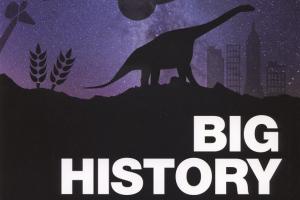
I have frequently cited St. Thomas Aquinas who defined the task of Christian systematic theology as showing how all things in reality are oriented toward the one God of grace. Today’s big historian is trying to show how all things in reality are oriented toward a non-theistic understanding of nature. According to Todd Duncan, a physicist at Pacific University in Oregon…
“Big History offers the possibility of a unifying, trans-cultural framework for orienting our everyday experiences within a modern scientific map of cosmic history. To realize its full potential, this framework needs to include a clear place within its map of reality for all aspects of human experience” (Gustafson, Lowell; Barry Rodrique, and David Blanks, eds 2023, 34).
Now, Duncan is not inhospitable to everything religious. He takes a step toward humility when granting that the model of the world manufactured by the physicist’s formal system of nature’s laws is incomplete. Reality is more than this model can account for.
“What is this fundamental reality that transcends our models of all types? I suggest the phrase meaningful mystery to describe it. There’s something deep and meaningful and magical beneath the surface of everyday experience” (Gustafson, Lowell; Barry Rodrique, and David Blanks, eds 2023, 40).
Might there be an opening toward transcendence here?
Conclusion
If BH were purely evidence-based, then signals of transcendence listened to by religious ears would become evidence. Sensitivity to realities beyond what empirical science can examine belong as much to human history as any other cultural phenomenon. To decide in advance that theism is mistaken shuts the door before the breezes of transcendence can blow through the investigation.
Science and religion in Big History: do these three belong together? You betcha.
Patheos SR 5052 BH 2 Science and Religion in Big History
More clicking:
Patheos SR 5051 BH 1 Science, Religion, and Deep Time
Patheos SR 5052 BH 2 Science and Religion in Big History
Patheos SR 5053 BH 3 Teilhard and the Meaning of Big History
Patheos SR 5054 BH 4 What is history in Big History?
Patheos SR 5055 BH 5 God in Cosmic History
Patheos SR 5056 BH 6 Big History and Evangelical Theology: Roger Olson
Patheos SR 5058 BH 8 Big History, Religious Naturalism, and Ursula Goodenough
Patheos SR 5059 BH 9 Big History and Progressive Christianity: Thomas Lindell
Patheos SR 5060 BH 10 Critique of Ted Peters by Mitchell Diamond
▓
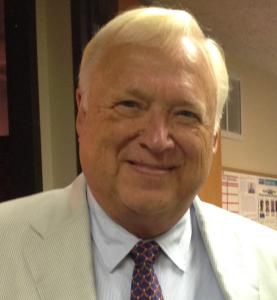 Ted Peters pursues Public Theology at the intersection of science, religion, ethics, and public policy. Peters is an emeritus professor at the Graduate Theological Union, where he co-edits the journal, Theology and Science, on behalf of the Center for Theology and the Natural Sciences, in Berkeley, California, USA. His book, God in Cosmic History, traces the rise of the Axial religions 2500 years ago. He tackled the implications of genetic innovation for the future of humanity in Playing God? Genetic Determinism and Human Freedom? (Routledge, 2nd ed., 2002) as well as For the Love of Children: Genetic Technology and the Future of the Family (Westminster/John Knox 1997). His essays are collected in Science, Theology, and Ethics (Ashgate 2003) The Voice of Public Theology (ATF 2023).
Ted Peters pursues Public Theology at the intersection of science, religion, ethics, and public policy. Peters is an emeritus professor at the Graduate Theological Union, where he co-edits the journal, Theology and Science, on behalf of the Center for Theology and the Natural Sciences, in Berkeley, California, USA. His book, God in Cosmic History, traces the rise of the Axial religions 2500 years ago. He tackled the implications of genetic innovation for the future of humanity in Playing God? Genetic Determinism and Human Freedom? (Routledge, 2nd ed., 2002) as well as For the Love of Children: Genetic Technology and the Future of the Family (Westminster/John Knox 1997). His essays are collected in Science, Theology, and Ethics (Ashgate 2003) The Voice of Public Theology (ATF 2023).
Recently Ted edited AI and IA: Utopia or Extinction? (ATF 2019). Along with Arvin Gouw and Brian Patrick Green, he co-edited the new book, Religious Transhumanism and Its Critics hot off the press (Roman and Littlefield/Lexington, 2022). His fictional spy thriller, Cyrus Twelve, follows the twists and turns of a transhumanist plot.
Visit Ted Peters’ website, TedsTimelyTake.com.
▓
References
Christian, David, Cynthia Stokes Brown, and Craig Benjamin, eds. 2014. Big History Between Nothing and Everything. New York: McGraw Hill.
Davies, Paul. 1983. God and the New Physics. New York: Simon and Schuster.
Gustafson, Lowell; Barry Rodrique, and David Blanks, eds. 2023. Science, Religion, and Deep Time. London: Routledge.
Nazaretyan, Akop. 2015. “Mega-Evolution and Big History.” In Our Place in the Universe: An Introduction to Big History, Volume I, by Leonid Grinin, and Andre Korotayev, eds. Barry Rodrigue, 125-143. Delhi: Primus Books.
Peters, Ted. 2017. God in Cosmic History: Where Science and Big History Meet Religion. Winona MN: Anselm Academic ISBN 978-1-59982-813-8.
Wilson, E O. 2014. The Meaning of Human Existence. London: W. W. Norton.




